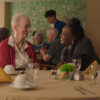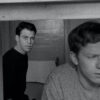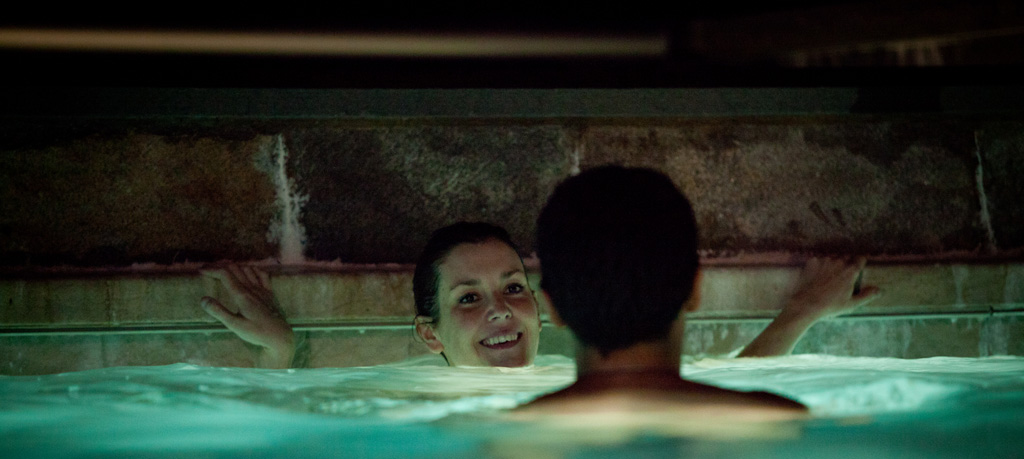One of the most memorable lines in Todd Louiso’s third feature “Hello I Must Be Going” arrives when the recently divorced Amy Minsky (Melanie Lynskey) takes a lunch with her former husband (Dan Futterman), who says with a tinge of regret, “I could see my life with you.”
The kind of declaration that usually serves as the start of great romances rather than announce the end of them, it’s a lament that makes an even greater impression when you discover it was written by Louiso’s wife Sarah Koskoff.
Before rushing to any conclusions, rest assured that the Louisos are doing just fine in holy matrimony and the line was inspired by a theater director who let go of Koskoff from a play (“I think I was harboring some resentment for this person,” she laughs). In fact, it’s not a reach to believe that Louiso’s finest film to date, an agreeably harmonious mix of the ennui that flooded his debut “Love Liza” and the broad comedy of his second film “The Marc Pease Experience,” is a result of the couple’s first collaboration as a writing/directing duo.
Perfecting the right balance isn’t limited to behind the camera, however, as “Hello I Must Be Going” is ultimately about Amy’s quest to find equilibrium in the life past the one she thought she’d have, retreating to her parents’ idyllic home in Westport, Connecticut to lick her wounds and curl up on the couch to watch Marx Brothers’ movies. Yet as pressure mounts externally (notably from her doting mother, played by Blythe Danner) and internally, Amy soon finds herself curling up with a much younger man (“Girls” star Christopher Abbott), providing some relief and inspiration while threatening a business deal for her father since the 19-year-old is the son of a client.
Although there always seems to be a hang-up of some type for Amy, the same can’t be said of the actress playing her, with a radiant Lynskey allowed to shine in a way she’s only been able to hint at before in smaller parts. During a recent phone conversation, Koskoff and Louiso spoke of the actress’ versatility, their personal career transitions from interpreting others’ work as actors to making it their own and the importance of family in Louiso’s productions.
How did this come together?
Sarah Koskoff: I wrote a rough pass and then we went to the Sundance Screenwriters Lab with it, submitted it to the lab and then we got in. [The Lab] is like an hour drive from Park City where the Institute is and the Institute is separate from the festival. It’s really just this amazing program [that] really supports small projects and I’m just incredibly grateful I got to go there.
We were there for five days and we just get a ton of feedback. There’s no writing that happens there, but screenwriters will sit with you for a couple of hours at a time and give you their thorough take on your script. Then they go away and discuss what the notes were and argue…they really care. It’s kind of an amazing thing.
Todd Louiso: After we did that, Sarah went back and did a rewrite based on all these different notes, which I imagine was a really hard process because you’re hearing so many things from a lot of different people, so you really have to let the dust settle. But then Sundance asked us to do a reading of the script after Sarah had done a couple rewrites and that’s when we asked Melanie Lynskey to read the lead role for that reading. We attached her to the film after that.
Though she had such a prominent debut in “Heavenly Creatures,” Melanie Lynskey seems to be one of those actresses everyone knows is great, but has rarely had the chance to sink her teeth into something like this. Is there some joy for you as actors to give her a role like this?
SK: There’s joy on our end mainly because she can hit all these different levels. She’s so dimensional as an actress and that’s really hard to find, somebody who can do a broad comic moment, still make it real and then go right from that to a really emotional scene. It’s hard to find. Also for someone to be so relatable… one of my friends described her as yummy. [laughs] I thought that was perfect. You just want to hug her and be her friend. When I go to the movies, I don’t always recognize the women up there. They’re not familiar to me, so that was very important to both of us to have somebody who women would feel represented by as a real person.
Again, since both of you have acting backgrounds, how did that evolve into going behind the camera?
TL: I’ve always been a filmmaker, ever since high school, really. I went to film school at NYU and I just started getting jobs as an actor, so I followed that path, but I was always still making things. And trying to make things when I had time off from acting jobs, then I had a lot of time off from acting jobs. [SK laughs] That gave me a lot of time to make some films.
SK: I had a different but similar path. I started working as an actor right out of college doing a lot of television and at the same time, I was always writing, mostly experimental theater stuff, so I would write plays and produce and perform them, direct them. That’s what I’m mainly versed in, but somehow this transition happened and it’s really fun. I actually prefer screenwriting now to playwriting.
Has your acting experience helped with what you want to do as filmmakers?
SK: Enormously.
TL: It’s such a great tool to have. When I went to NYU, I did every job on a crew and I didn’t know at the time I was educating myself, but I really was. I was a [production assistant] or I was a gaffer or I was an assistant cameraman a couple times, catering…you do all that stuff and then acting, you really know what everybody on the set is doing or supposed to be doing. That’s such a huge part of being a director is knowing what everyone else is going through and being able to help get them what they need, understand what they’re doing and what they need to be doing… most importantly for the actors.
This may be purely coincidental, but a recurring theme in Todd’s work seems to be coming to terms with disappointment. Is there actually something there that keeps you coming back?
TL: It’s not really a conscious decision really. It’s just sort of what I’m interested in, I guess.
SK: Misery and suffering… (laughs)
TL: What I love about this film is its joyfulness. There’s a real joy to it and in making it with Sarah, because we really collaborated on the whole thing from start to finish was a tone that doesn’t go too far in the very misery/sadness way or too superficial and zany. There’s a really good mixture of sadness, depression, but also…
SK: A ridiculousness…
TL: [laughs] And a ridiculousness. I loved that. I love a mixture of those kinds of things in films. I love when something is really, really sad and then also incredibly funny because it’s sad. So that’s what I’m drawn to really.
What’s also been interesting is how each of your films has been a family productions, whether it was “Love Liza” with the Hoffmans (written by Gordy and starring Philip Seymour) or “The Marc Pease Experience” with Sarah’s brother Jacob as a co-writer. Has that been an important element to have around you?
TL: It’s important to me. People in my life who I love, there’s a reason they’re in my life is because we share the same sort of sense of art and are interested in the same things. That doesn’t mean I’m not interested in working with other people – I am, but it’s hard to find something that you really care about. You’re going to say okay, I’m going to work on this for the next three or four years of my life and feel a connection with somebody. It’s hard to enter into a relationship like that, if it’s just a random person.
How did the Marx Brothers come up as connective tissue for this film?
SK: I have loved the Marx Brothers and early in our relationship I forced Todd to watch every Marx Brothers movie. Now, I found a way to make everyone who comes to see this movie watch my favorite scene.
TL: Sarah told me, she said she put the Marx Brothers in there so if the movie turned out terrible at least she knew…
SK: …there’d be a few good moments. We’ve talked a lot about how Amy is like an unconscious Groucho. She’s in this very stiff, stratified world and she goes in and just her presence goes in and screws everything up every time. [TL laughs] In a way, the movie is her process of owning that, that she’s really an artist, she’s different and she doesn’t fit in and that’s just her truth.
TL: [The clips] also work in a lot of different ways. They work in keeping the tone from going too far down the rabbit hole and they also show the progression of Amy’s relationship with her dad because they used to watch those films when she was little. They watch the first clip and it’s very comforting — she and her dad have a very good conversation, but it could’ve been a conversation she had with him when she was 13. Then she sees the other clip when she’s with Jeremy, but then it’s repeated at the end where she’s at home and she’s watching the Marx brothers. It doesn’t give her the same comfort as it used to and she knows she’s too old for it, that that doesn’t work anymore.
SK: Even Groucho is saying, “I must be going” in that one.
You’ve said that you actually wanted to visually portray Amy’s home life with her parents as different from relationship with Jeremy – the former mostly takes place in that airy, spacious house and filmed with a static lens while the latter is more tightly shot and looser. Was that built into the screenplay into how you would depict those relationships?
TL: We talked about that a lot.
SK: The scenes that happened between Jeremy and Amy, they were happening mostly at night and there was a lot of hiding going on [with the characters], but I felt like Todd and Julie Kirkwood, the cinematographer, really took it to another level with the style they shot it in and the way it was interpreted. I loved that.
TL: I try not to be intrusive when directing and where the camera is because I don’t like to draw attention to the camera. I really like focusing on the story and the characters and the script.
SK: But the style was more wild [in the Jeremy-Amy sequences] and there was a sense of the family being very constrained and the camera being really locked. There was a lot of handheld with Amy and Jeremy, this sense of what’s pushing underneath that’s dangerous and untamed and there is sexual attraction.
TL: And the house is the most beautiful house. It’s supposed to be clean and sterile, but I didn’t want it to be like “Safe,” the Todd Haynes movie, so there are a lot of splashes of color in there. There aren’t a lot of plants in it, but it is surrounded by nature and there’s tons of windows in the house. So you’ve got all this nature outside of the house, but nothing alive really inside the house. Amy’s trapped in that house. The moment she gets out, she’s with Jeremy, and she’s in the woods or in the car and like Sarah said, it’s handheld, but whenever she goes back into the house, it’s more static and more controlled.
There’s even something I thought of a couple weeks ago — Blythe [Danner]’s character Ruth, I don’t think we ever really see her outside in nature. Even when we do see her when she does leave the house, she’s usually like scuttling about like a crab like having to get back into the house.
While I wouldn’t want to get too personal, this is your first time working together as a writing/directing team. Since the film actually deals with the idea of marriage and commitment as it relates to Amy’s divorce, was it interested for you to bat these ideas around?
SK: We’ve been together for a while and have explored every possible up and down together.
TL: We’ve been together like…God, like a year-and-a-half.
SK: Shut up. [slight laugh] We’ve been together a long time. So yeah, relationship knowledge and the ability to tell Todd to shut the fuck up comes in handy.
TL: [laughs] I wish we were on Skype right now.
“Hello I Must Be Going” opens in Los Angeles at the Landmark and New York at the Angelika Film Center on September 7th before expanding on September 14th. A full list of theaters can be found here.




